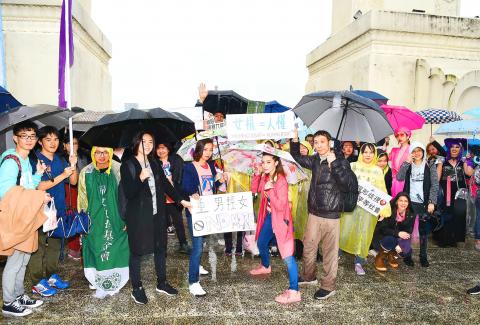The third annual Women’s March in Taipei yesterday afternoon called on people of all backgrounds to unite in support of women’s rights.
Women’s March Taiwan founder Crystal Liu (劉小妤) said that regardless of gender identity or sexual orientation, gender inequality is a universal issue that affects everyone.
“Of course we are celebrating women, but we are also celebrating that everyone can support women’s rights,” Liu said.

Photo: Hu Shun-hsiang, Taipei Times
About 100 people, including representatives from the Canadian Trade Office in Taipei, which sponsored the event, participated in the march to mark International Women’s Day.
Participants held signs and shouted: “Women’s rights are human rights,” echoing calls in the global feminist movement.
Before the march began, organizers held a brief ceremony to remember victims of gender-based violence at Huashan 1914 Creative Park, close to where a 30-year-old woman surnamed Kao (高) was murdered and dismembered, allegedly by her archery instructor, in June last year after rejecting his sexual advances.
The march was “for a future in which women do not have to fear anything,” organizer Maja Ho (候梅婷) said at the ceremony.
Taipei Women’s Rescue Foundation chief executive officer Fan Ching (范情), whose organization was among the participants, said that eliminating gender stereotypes and discrimination is part of the foundation’s commitment to preventing sexual and domestic violence.
“We are happy to participate, most importantly because the Women’s March is not just an international movement, but where we see young people coming forward and taking the initiative on their own,” Fan said.
The march started at 1:30pm and proceeded through Liberty Square to Hsin-Yi Family Square Theater, where singers Lara Veronin (梁心頤), Esther Veronin (梁妍熙), Maxine Chi (祈錦鈅) and Midi Yang (楊士弘) were among the performers.
Taipei District Court Family Division judge Li Liling (李莉苓), artist and photographer Pong Yi-ping (彭怡平) and Awakening Foundation head of public relations Chou Yu-hsuan (周于萱) also took the stage to speak about their experiences of gender inequality.

Taiwanese can file complaints with the Tourism Administration to report travel agencies if their activities caused termination of a person’s citizenship, Mainland Affairs Council Minister Chiu Chui-cheng (邱垂正) said yesterday, after a podcaster highlighted a case in which a person’s citizenship was canceled for receiving a single-use Chinese passport to enter Russia. The council is aware of incidents in which people who signed up through Chinese travel agencies for tours of Russia were told they could obtain Russian visas and fast-track border clearance, Chiu told reporters on the sidelines of an event in Taipei. However, the travel agencies actually applied

Japanese footwear brand Onitsuka Tiger today issued a public apology and said it has suspended an employee amid allegations that the staff member discriminated against a Vietnamese customer at its Taipei 101 store. Posting on the social media platform Threads yesterday, a user said that an employee at the store said that “those shoes are very expensive” when her friend, who is a migrant worker from Vietnam, asked for assistance. The employee then ignored her until she asked again, to which she replied: "We don't have a size 37." The post had amassed nearly 26,000 likes and 916 comments as of this

New measures aimed at making Taiwan more attractive to foreign professionals came into effect this month, the National Development Council said yesterday. Among the changes, international students at Taiwanese universities would be able to work in Taiwan without a work permit in the two years after they graduate, explainer materials provided by the council said. In addition, foreign nationals who graduated from one of the world’s top 200 universities within the past five years can also apply for a two-year open work permit. Previously, those graduates would have needed to apply for a work permit using point-based criteria or have a Taiwanese company

The Shilin District Prosecutors’ Office yesterday indicted two Taiwanese and issued a wanted notice for Pete Liu (劉作虎), founder of Shenzhen-based smartphone manufacturer OnePlus Technology Co (萬普拉斯科技), for allegedly contravening the Act Governing Relations Between the People of the Taiwan Area and the Mainland Area (臺灣地區與大陸地區人民關係條例) by poaching 70 engineers in Taiwan. Liu allegedly traveled to Taiwan at the end of 2014 and met with a Taiwanese man surnamed Lin (林) to discuss establishing a mobile software research and development (R&D) team in Taiwan, prosecutors said. Without approval from the government, Lin, following Liu’s instructions, recruited more than 70 software